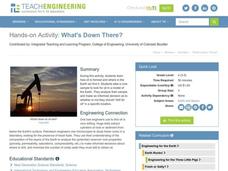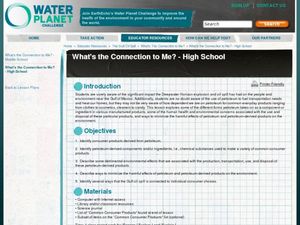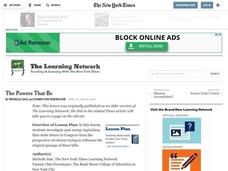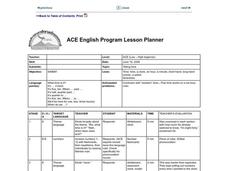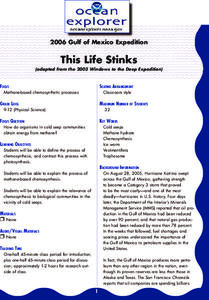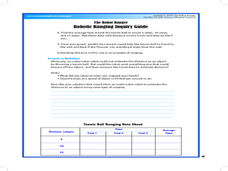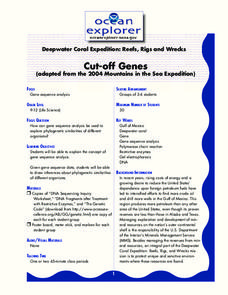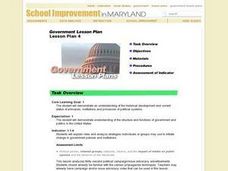Curated OER
CSI on the Deep Reef
Young scholars read about, discuss, and research chemotrophic organisms. In this chemosynthesis lesson, students discuss the differences between photosynthesis and chemosynthesis. They learn that chemosynthesis includes a variety of...
Curated OER
Oil Trap Model
Pupils investigate oil accumulation by creating a model in their classroom. In this petroleum geology instructional activity, students discuss where oil comes from and why it is vital to our society at this particular time. Pupils cut...
Curated OER
What's down there?
students analyze how oil is formed and where in the Earth we find it. Students take a core sample to look for oil in a model of the Earth. They analyze their sample and make an informed decision as to whether or not they should "drill...
Curated OER
America's Energy Future
Young scholars write a proposal to save energy resources. In this energy lesson, students research nuclear energy, coal power, petroleum, natural gas, hydroelectric power, and renewable energy. Young scholars then debate energy issues...
Curated OER
Slick Moves: Exploring the Controversial Plan to Drill in the Arctic National Wildlife Refuge
Students recount their knowledge of natural resources and articulate their understanding of the multi- faceted debate that surrounds drilling in the Arctic National Wildlife Refuge. They then examine the complexity of drilling in the...
Curated OER
Modernizing a Traditional Irish Folktale
Students write their own folktales based on "Cathal O'Cruachan and the Cowherd." In discussions they examine the animal symbolism in the story, as well as the characters, events, problems, and solution. With partners, they select...
EngageNY
The Painted Essay for Opinion Writing: Developing a Conclusion and Adding Linking Words
Let's get colorful! Scholars use the Painted Essay technique to analyze and color code the conclusion of a model essay. Working in small groups, pupils then write a conclusion paragraph for their draft editorials about offshore drilling.
Curated OER
What's the Connection to Me?
Students discuss the impact of oil spill to the environment and to their daily lives. In this environmental science lesson, students research the pros and cons of petroleum based products. They share their findings in class.
Curated OER
The Powers That Be
Students investigate past energy legislation, then write letters to Congress from the perspective of citizens trying to influence the original passage of these bills. Each small group does their research using a website imbedded in this...
Curated OER
Slide Right On By Using an Inclined Plane
Fourth graders examine the simple machine known as a plane. They build their own pyramid and identify the role of screws. They participate in a hands-on activity in which they determine the angle in which to make it easier to pull.
Curated OER
Telling Time
Students tell time. In this ELL vocabulary development and math lesson, students orally tell time to five minute intervals when shown a classroom clock. Students practice using number and "telling time" vocabulary in sentences and...
Curated OER
Natural Gas Lesson-How Natural Gas Forms
Students examine background natural gas and how it is formed and what it is made of. Titles within the series include How Natural Gas Forms, What Happens to Natural Gas when it is burned, and How Natural Gas can be used. Provides very...
Curated OER
This Life Stinks
Chemosynthetic communities of cold seep areas are considered in this lesson. Working in collaborative groups, marine biology or oceanography learners research and prepare a report about oxidation-reduction reactions involved with...
Curated OER
Tornado In A Bottle
Students are able to visualize a tornado usig a simple experiment. They are divided into small groups. Students drill a 3/8 inch hole in the center of each bottle cap. Students connect the caps to the top of each other using glue. ...
Curated OER
One World Ocean
Students compare and contrast the properties of salt water in the oceans/seas and freshwater elsewhere on the planet. They also analyze mixing caused by currents in the ocean, including the effects of warm and cold water as well as with...
Curated OER
Cleaning Water: How Filters Work
Students construct their own water filter to obtain clean water. In this filtration lesson, students produce tainted water in order to properly filter it with filtration devices made in class.
Curated OER
The Robot Ranger
Students participate in an experiment to understand how robotic systems can estimate distances. In this robotic ranger lesson, students measure the the time it takes for and object to move back and forth. Students will use a tennis...
Curated OER
Marine Archaeology
Students examine marine archaeology. In this archaeological data lesson, students see how archaeologists use data to make inferences about shipwrecks. Students read data and make their own inferences, write about marine life and...
Curated OER
Cut-Off Genes
Students explain the concept of gene sequence analysis. In this gene lesson, students draw inferences about phylogenetic similarities of different organisms.
Outdoor Learning Center
Outdoor Survival
Which of the following can you survive without for the longest time: water, food, or a positive mental attitude? The answer may surprise you. Guide learners of all ages through games, activities, and discussions about surviving in the...
Curated OER
Government Lesson Plan: Lesson Plan 4
Pupils analyze how interest groups present their viewpoint to the public. They assess how media can influence public opinion by closely examining a political ad from the 1964 presidential election.
Curated OER
Lesson Plan 4: Political Advertising
Students observe a political advertisement and evaluate the views promoted in the ad. After exploring governmental policies, students create their own 30-second ad to promote a specified cause and publicize their views. Students share...
Curated OER
Slick Moves
Students examine the Bush Administration's plan to drill for oil in the Arctic National Wildlife Refuge from varying points of view.
Curated OER
Cool Corals
Students explore corals and polyps. In this coral reef lesson plan students divide into groups and prepare a written report.




